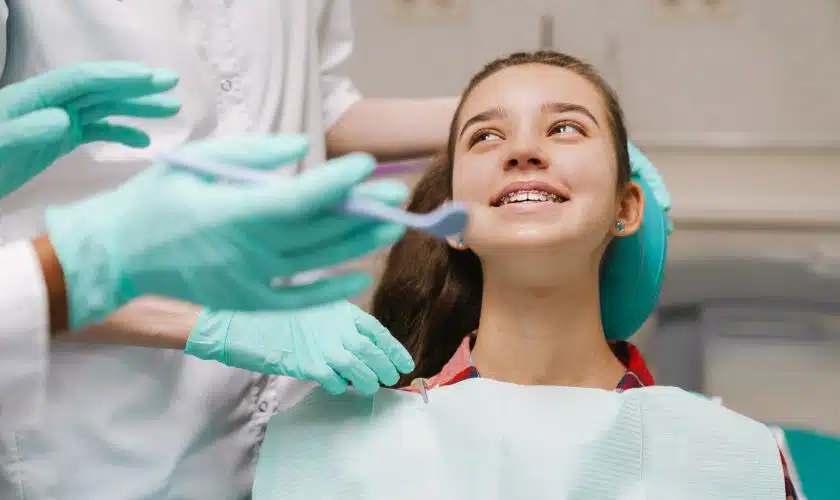Jaw clenching, often linked to stress or misaligned teeth, is a growing concern among teenagers. This habit can lead to persistent discomfort known as clenching jaw pain, which may affect daily activities such as eating, speaking, or even sleeping. Dentists play a vital role in diagnosing and treating this condition, often incorporating strategies like TMJ care and stress management to alleviate symptoms and prevent further complications.
In this blog, we’ll explore the causes of jaw pain from clenching, how it impacts teenagers, and the dental treatments available to address the issue effectively.
What Causes Jaw Pain from Clenching?
Jaw clenching, also referred to as bruxism, can occur during the day or at night (nocturnal bruxism). It is often unconscious, making it difficult to identify without clear symptoms.
Common Causes:
Stress and Anxiety: Emotional stress is a significant trigger for clenching and grinding teeth.
TMJ Disorders: Dysfunction of the temporomandibular joint (TMJ) can exacerbate jaw clenching.
Malocclusion: Misaligned teeth or an uneven bite can lead to excessive strain on the jaw.
Lifestyle Factors: Poor sleep habits, caffeine intake, or certain medications may increase the likelihood of bruxism.
Symptoms of Clenching Jaw Pain in Teenagers
Teenagers experiencing clenching jaw pain may exhibit the following symptoms:
Persistent jaw or facial pain, especially upon waking.
Headaches, often in the temples.
Clicking or popping sounds in the TMJ.
Difficulty opening or closing the mouth fully.
Worn-down teeth or increased tooth sensitivity.
If left untreated, chronic clenching can lead to more severe complications, such as TMJ disorders or cracked teeth.
How Dentists Diagnose Jaw Pain from Clenching
Dentists use a combination of patient history, physical examination, and diagnostic tools to identify the root cause of clenching jaw pain.
Steps in Diagnosis:
Oral Examination: Assess for worn tooth surfaces, enamel cracks, or gum recession.
TMJ Evaluation: Check for tenderness, clicking, or restricted movement in the temporomandibular joint.
Patient History: Discuss stress levels, sleep patterns, and lifestyle habits.
Imaging Tests: X-rays or MRI scans may be used to assess jaw joint health or rule out structural issues.
Treatment Options for Clenching Jaw Pain
Once diagnosed, dentists implement personalised treatment plans to alleviate jaw pain and address its underlying causes.
1. Custom-Made Night Guards
Night guards, also known as occlusal splints, are one of the most effective solutions for nocturnal jaw clenching.
How They Work: These appliances prevent teeth from grinding against each other and reduce strain on the TMJ.
Benefits: Protects teeth from damage, reduces morning jaw pain, and promotes better sleep.
2. TMJ Care
For teenagers with TMJ disorders contributing to jaw pain, dentists may recommend:
Physical Therapy: Exercises to improve jaw mobility and reduce tension.
Anti-Inflammatory Medications: Relieve swelling and pain in the TMJ area.
Laser Therapy: Non-invasive treatment to relax muscles and improve joint function.
3. Orthodontic Solutions
If malocclusion is the cause, orthodontic treatments like braces or clear aligners can correct the bite and alleviate jaw strain.
4. Stress Management Techniques
Since stress is a significant factor in jaw clenching, incorporating stress management strategies is crucial.
Relaxation Exercises: Deep breathing, meditation, or yoga.
Counselling or Therapy: Helps teenagers identify and manage stressors.
Lifestyle Changes: Limiting caffeine intake and improving sleep hygiene can also reduce bruxism.
5. Botox Injections
In some cases, dentists may use Botox to relax overactive jaw muscles and reduce clenching.
Advantages: Temporary relief for severe cases of bruxism.
Considerations: Effects typically last 3–6 months and may require repeat treatments.
Preventing Jaw Pain from Clenching
Prevention is a key component of long-term care. Parents and teenagers can adopt the following habits to minimise the risk of jaw clenching:
Practice Good Posture: Avoid slouching, which can strain the jaw and neck muscles.
Limit Screen Time: Excessive use of phones or computers can lead to tension in the jaw area.
Encourage Regular Check-Ups: Routine dental visits help identify early signs of clenching.
Promote Relaxation: Encourage teens to take breaks during stressful periods, such as exam seasons.
When to Seek Professional Help
If jaw pain persists despite home remedies or begins to interfere with daily life, it’s time to consult a dentist. Early intervention not only alleviates discomfort but also prevents long-term damage to teeth and the TMJ.
Clenching jaw pain in teenagers is a common but treatable issue. With a combination of TMJ care, stress management, and dental interventions like night guards or orthodontic treatments, dentists can provide effective relief and long-term solutions.
If your teenager is struggling with jaw pain or related symptoms, don’t hesitate to reach out to a dental professional. Addressing the problem early ensures healthier, pain-free smiles for years to come.

